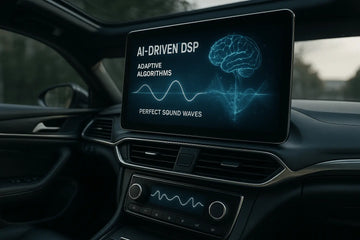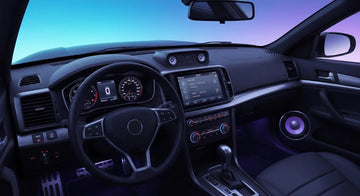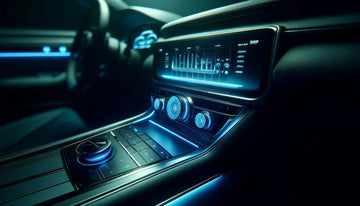AI-Driven DSP Revolution
The Future of Car Audio Processing 2025
Welcome to the AI Audio Revolution
Artificial Intelligence is transforming car audio processing from manual tuning to intelligent, adaptive systems that learn and optimize automatically. This comprehensive guide explores cutting-edge AI DSP technology that's reshaping the industry.
Traditional DSP Limitations
- • Manual tuning required for each installation
- • Static processing regardless of music content
- • No adaptation to environmental changes
- • Requires expert knowledge for optimization
AI DSP Advantages
- • Self-tuning and automatic optimization
- • Real-time adaptation to music genres
- • Environmental noise compensation
- • Continuous learning and improvement
Machine Learning Audio Processing
Understanding the AI algorithms that power next-generation DSP systems
Adaptive EQ Algorithms
AI systems analyze frequency response in real-time and automatically adjust EQ settings based on:
- • Listener preference learning
- • Music genre recognition
- • Cabin acoustic analysis
- • Dynamic range optimization
Environment Analysis
Smart detection systems continuously monitor and adapt to:
- • Road noise levels and frequency
- • Vehicle speed compensation
- • Window position detection
- • Passenger occupancy changes
Predictive Processing
AI anticipates audio dynamics and prepares processing for:
- • Musical transitions and dynamics
- • Bass impact preparation
- • Vocal clarity enhancement
- • Stereo imaging optimization
Automatic Tuning Revolution
AI systems that tune themselves with minimal user intervention
Self-Calibrating Systems
Microphone Array Analysis
Multiple microphones positioned throughout the cabin collect acoustic data, measuring frequency response, time delays, and phase relationships at various listening positions.
AI Processing Engine
Machine learning algorithms analyze the collected data to identify acoustic anomalies, speaker positioning effects, and optimal correction parameters.
Automatic Implementation
The system automatically applies time alignment, EQ corrections, crossover adjustments, and level balancing without manual intervention.
Intelligent Room Correction
Cabin Mapping
AI creates 3D acoustic map of vehicle interior
Problem Identification
Detects standing waves, reflections, and cancellations
Correction Application
Applies precise EQ and time domain corrections
Continuous Optimization
Monitors and refines corrections over time
Smart Sound Processing Features
Advanced AI algorithms that understand and enhance your music
Genre Recognition
AI identifies music genres and applies optimized processing profiles automatically
Vocal Enhancement
Machine learning isolates and enhances vocal frequencies for crystal-clear dialogue
Spatial Processing
AI-powered instrument separation creates immersive 3D soundstages
Dynamic Processing
Intelligent compression and expansion optimized for each musical passage
Real-World AI Processing Examples
Classical Music
- • Wide dynamic range preservation
- • Natural instrument timbre
- • Enhanced spatial imaging
- • Subtle room ambience
Electronic/EDM
- • Deep bass enhancement
- • Crisp high-frequency details
- • Punchy transient response
- • Sub-bass extension
Vocal/Acoustic
- • Vocal presence enhancement
- • Natural string resonance
- • Breath and detail clarity
- • Intimate soundstage
Adaptive Performance Systems
AI that learns, adapts, and evolves with your listening habits
Learning User Preferences
Listening Pattern Analysis
AI monitors volume preferences, EQ adjustments, and listening times to build personalized profiles
Multi-User Recognition
Voice recognition or smartphone detection automatically switches between user profiles
Predictive Adjustments
System anticipates preferences based on time of day, music genre, and driving conditions
Environmental Adaptation
Noise Compensation
Real-time adjustment for road noise, wind, and traffic conditions using external microphones
Speed-Based Tuning
Automatic volume and EQ adjustments based on vehicle speed and ambient noise levels
Climate Integration
Compensation for acoustic changes due to temperature, humidity, and air conditioning
Predictive Maintenance & Health Monitoring
System Health Analysis
- • Speaker impedance monitoring
- • Amplifier temperature tracking
- • Signal path integrity checks
- • Power supply voltage monitoring
- • Thermal protection optimization
Predictive Recommendations
- • Preventive maintenance alerts
- • Performance degradation warnings
- • Optimal settings suggestions
- • Upgrade pathway recommendations
- • Usage pattern optimization
Premium AI DSP Systems
Cutting-edge AI-powered processors available at Audio Intensity
Entry-Level AI DSP
$1,500-2,500
- • Basic genre recognition
- • Automatic room correction
- • Simple user profiling
- • 8-channel processing
- • Mobile app control
Professional AI DSP
$2,500-4,000
- • Advanced machine learning
- • Multi-user recognition
- • Environmental adaptation
- • 16-channel processing
- • Predictive maintenance
Flagship AI DSP
$4,000+
- • Cutting-edge AI algorithms
- • Real-time learning
- • Full environmental suite
- • 32+ channel processing
- • Cloud connectivity & updates
Why Choose Audio Intensity for AI DSP?
Expert Selection
Curated collection of the most advanced AI DSP systems
Technical Support
AI DSP specialists to help with setup and optimization
Latest Updates
Access to newest AI algorithms and firmware updates
Partnership
Direct relationships with leading AI DSP manufacturers
Implementation & Setup Guide
Getting the most from your AI DSP investment
Initial Setup Process
Physical Installation
Mount DSP unit, connect power, ground, and signal cables
Microphone Placement
Position calibration microphones for optimal acoustic sampling
AI Calibration
Run automated calibration sequence for initial AI learning
User Profiling
Configure user preferences and listening profiles
Optimization Tips
Learning Period
Allow 2-4 weeks of normal listening for optimal AI adaptation
Music Variety
Play diverse genres during learning period to train AI comprehensively
Manual Feedback
Use app controls to guide AI learning with your preferences
Regular Updates
Keep firmware updated for latest AI improvements
Common Implementation Challenges
Microphone Issues
- • Poor placement affecting accuracy
- • Interference from road noise
- • Calibration in wrong conditions
Learning Confusion
- • Inconsistent user preferences
- • Multiple users without profiles
- • Insufficient learning time
System Integration
- • Compatibility with existing equipment
- • Signal level mismatches
- • App connectivity problems
Future of AI DSP Technology
What's coming next in AI-powered car audio processing
Cloud AI Integration
Collective Learning
AI systems sharing knowledge across millions of installations for improved algorithms
Real-Time Updates
Instant algorithm improvements and new feature deployment
Advanced Analytics
Detailed usage analytics and performance optimization recommendations
Vehicle Integration
CAN Bus Integration
Direct connection to vehicle systems for speed, GPS, and climate data
Biometric Sensors
Heart rate and stress monitoring for mood-adaptive audio processing
Autonomous Vehicle Ready
Enhanced entertainment focus for self-driving vehicle passengers
Voice AI Integration
Natural language control and voice-based preference learning
Spatial Audio
3D audio positioning and virtual reality audio experiences
Wellness Integration
Audio therapy and stress reduction through intelligent sound design
Ready to Experience AI-Powered Car Audio?
The future of car audio is here today. AI-driven DSP technology represents the most significant advancement in mobile audio processing since the introduction of digital signal processing itself. Don't settle for manual tuning when intelligent systems can optimize your audio experience automatically.
Expert Consultation
Speak with our AI DSP specialists
Professional Installation
Certified AI DSP installation services
Demo Available
Experience AI DSP before you buy
Audio Intensity
Your Source for Cutting-Edge Car Audio Technology




